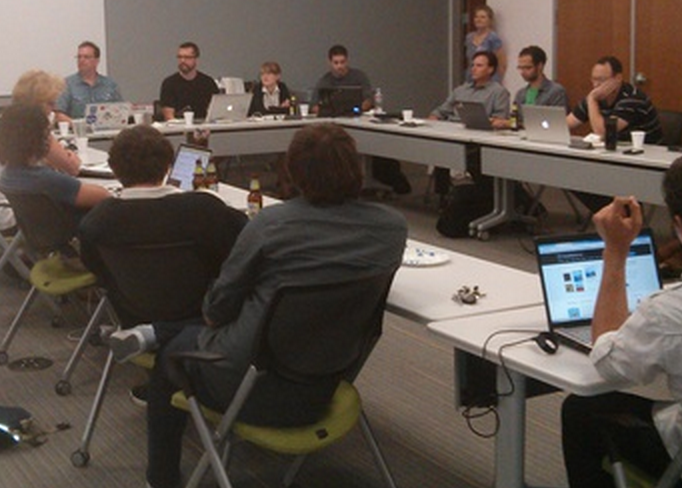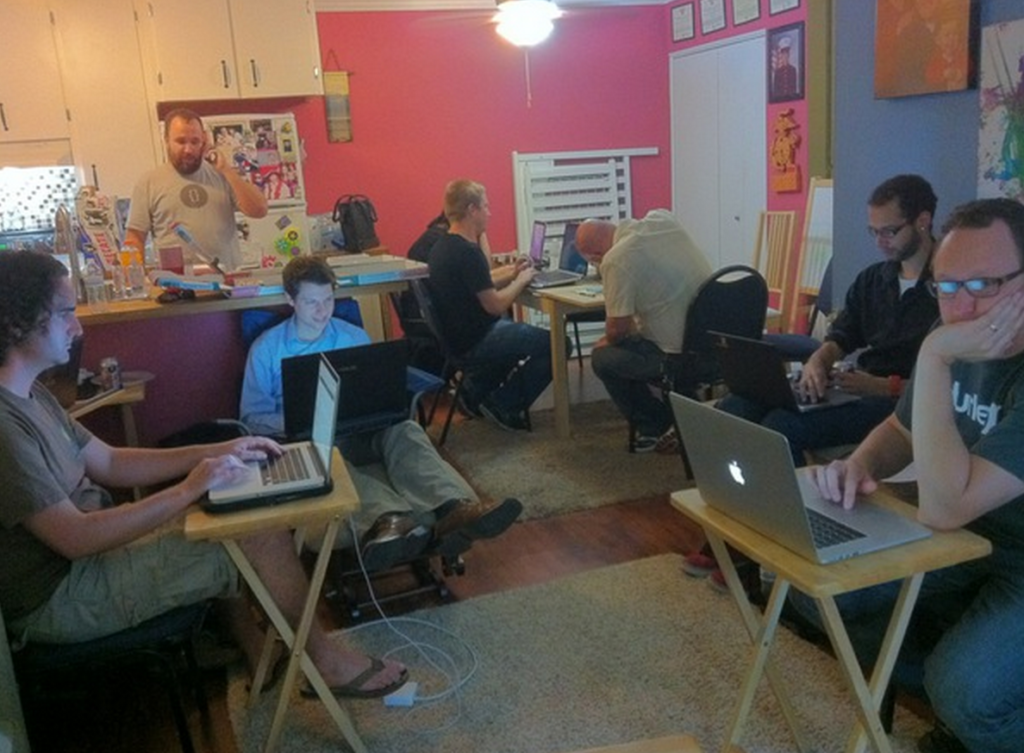When I first got into WordPress in 2009, I never thought that years later I’d be helping to manage an active 2,200+ online Advanced WordPress (AWP) Community, or a 30+ Local AWP Monthly San Diego Meetup.
Over the years, community building within the WordPress space has been a hard road full of personalities and individual interests. But it’s something that I enjoy doing and have a lot of passion for. When I was recently approached by Torque to become a regular “Community” contributor, I realized that I do have a lot to say about this amazing community, and a lot that I want to give back too.
The WordPress community is a meritocracy, and its members are often measured by what they contribute. Recognizing your strengths is half the challenge. Figuring out a way to share them with others is a way to give back.
Today, I thought I’d share my views on one of the most difficult topics out there for growing communities: organizing people. One of my favorite books is 2007’s What Would Google Do?, by Jeff Jarvis. Taking some of its main points, I’m going to remix it a bit in an attempt to explain to you how I find the best communities work.
Rethink Your Community Relationships
Give people control; they will use it.
Before we started AWP 2 years ago, many of us had been to WordPress groups where the founders and organizers wanted full and complete control over everything involved. We realized early on that this had put a bad taste in our mouths, so we gave control away to anyone who wanted it! This allowed the people to step up who maybe wouldn’t have normally. And now I believe we have some of the best admins and organizers helping us out.
Your worst members are your best friends.
Now I’m a patient man. But from time to time we would run into people that anyone would classify as having difficult personalities. Instead of kicking them out of the group, though, we listened to them. We heard the good and the bad—and only in the extreme cases did we expel people from the group.
We try to be unnecessarily inclusive instead of exclusive, even for a topic as difficult to grasp as Advanced WordPress, and this has helped us out tremendously.
Your best members are your partners.
AWP has members from all over the world. People from as far away as Australia tune into our small little San Diego Meetup live feeds, not because we have anything different or extraordinary to share, but because we get everyone involved. We get everyone sharing interesting things so that every member is a partner in making our content and discussions relevant.
Rethink Your Community and Personal Ethics
Make mistakes well.
Early on we tried to limit our online and in-person discussions to Advanced Topics. We felt this would make the community worth being a part of and would both force and propel people to grow in their coding or design abilities. It also helped remove much of the stuff that normally drives people away.
Yet I’m not perfect, and neither are the people who run the group, so we sometimes break our own rules. When we do, we expect people to call us out on it. When they do so, I’m okay with admitting that I made a mistake and I try my best to hold myself to the same standard I hold others.
Everything is a Beta.
We have no idea what we are doing, to be honest with you. The original AWP Facebook group started with about 20 of us just sharing stuff we found regularly (and giving each other crap). Yet that’s okay; it’s okay to not have everything figured out right off the bat.
When we started the Google+ Group for AWP, I had many people that reached out afraid that we would fragment the group—but sometimes that’s okay. The belief that what we are doing is like writing Beta software allows us, as a community, to do stuff that may work…or may utterly crash and burn. Just keep the stuff that works and move on.
Be honest, Be transparent, Collaborate.
There’s not much else that needs to be said here, though you’d be surprise how hard this is for some.
Rethink the Reality of Your Community
Manage abundance (don’t control scarcity).
I’m okay with people promoting their company to AWP as long as it’s done in a way that creates value to the group. I’m also okay with the plethora of discussions that go on—both online and in person—that I have nothing to do with or can’t keep up with. The more that people are talking, the better the community becomes for everyone. Trying to control that will just leave a bad taste in people’s mouths, like it did for us a few years ago.
Atoms are a drag; meeting in person can sometimes be overrated.
We’ve been lucky enough to have consecutive monthly Meetups every month for the last two years, but to be honest the best discussions we have are online. I always share my Google account ([email protected]) or my Skype (bastosmichael) with everyone in the group because I want people to reach out, ask questions, or just simply share something cool with me online that can’t wait for the Meetup night.
Middlemen are doomed.
It’s very common for people to try and start a community for the sole purpose of getting business. And there’s nothing wrong with that; yet I’ve learned that people tend to pick up on that sort of thing and will gravitate towards the communities that want real and open discussions, not just a sales pitch forum.
Free is a business model.
I charge a voluntary $5 per in person Meetups in order to help offset the cost of food or beer (yes we live in San Diego) but even if everyone pays, that barely covers the costs involved to host the events each month.
We have been lucky enough to have great venue hosts like 3rdSpace and Co-Merge host us over the years, but I believe its okay to give to your community out of your own pocket as long as you can afford it. I have a great job with a generous salary so I’m not hurting in helping to pay for pizza or put in to support a WordCamp or two, these sorts of things pay great dividends down the line.
Decide what community you’re in.
Since we started AWP for more advanced WordPress users, I’ve seen a flurry of other niche WordPress groups for Artists, Designers and even Sales folks. This is great, it means people are determining the niche in the WordPress space that they want to fill and are doing what they need to reach out and fill the void.
Rethink Your Attitude Towards Other Groups
There is an inverse relationship between control and trust. (David Weinberger)
I allow other groups to cross promote themselves on AWP all the time, many of them are niche in nature and others are local to their area or country. Short of banning Nigerian spammers, there’s not much I won’t allow in the group because I trust the people in the group, and the admins, and they should ultimately have control over what they want to talk about.
Trust the people, they are smarter than you think.
I sometimes feel like I’m a smart guy, but then I run across someone that is a genius at a particular topic and what they decide to share at our monthly events ruins my weekends because I end up having to try it out for myself. Our Meetups consist of zero presentations, meaning you’re not coming out to AWP because of what one person is planning to share, but to see what the entire group wants to show off or discuss.
Listen and never stop.
Easier said than done for most people. As a software engineer, I tend to think I know what I’m talking about more than the people I’m talking to. I have to force myself to shut up and listen so that I don’t end up with my foot in my mouth in front of the community.
Rethink your Imperatives and be Willing to Cannibalize Your Membership
Beware the cash cow in the coal mine.
This analogy is more representative of a business that has a cash cow, aka a product or service that people really like and are willing to pay for. The idea behind this statement is that if you’re not willing to cannibalize your profit model, the more likely it is that another (cheaper and faster) competitor will come to cannibalize your profit model instead.
The same thing still applies to communities. One day you have a ton of interactions; the next day fewer people are having a conversation. Be willing to split your community into even tighter groups that can get really passionate about a project or an idea. This will benefit all of the members in the long run, as more people will have interesting things to share.
Encourage, enable and protect innovation.
If someone comes up to me and tells me they want to try something on AWP’s website or on the Facebook page, I almost never say no. As long as it follows our original rule (needs to be an advanced topic) they pretty much have free reign to try anything new.
Sometimes the ideas are not welcomed by members; sometimes they are full of controversy; sometimes they work; sometimes they don’t. If I see someone trying something new and everyone is ganging up against them, I tend to step in and try my best to explain the concept as I understand it. We’ve had ups and downs with this strategy, but I try to defend innovation where it’s important.
Get out of the way. (Craig Newmark)
The final-but-true statement to running a successful large community is to just get out of the way. You can’t control everything and you shouldn’t want to. People have their own initiatives, their own ideas and projects they want to follow through with. I’m the type of person that likes to give them the tools they need and just step back and see what they can do with it.
In Conclusion
I’m proud of the Advanced WordPress community and what it’s become over the last two years since we started. I can honestly say I had nothing to do with it. I just followed the above principles as best as I could and the group did the rest. It attracted the best, and is now one of my favorite places on the web to hang out.
Please share with us in the comments below where you like to go to talk about WordPress.
 Self & School taught C++, Java, PHP, Perl and Ruby Open Source Developer working as a Software Engineer for SPAWAR Research (G2 Software Systems) with a BSCS degree. Started using and developing on WordPress in 2009 and started the AdvancedWP.org community in 2011 which now has over 1,400 members world wide across 3 social networks. Has spoken at over half a dozen or more WordCamps on a range of advanced topics. Message him on twitter @bastosmichael.
Self & School taught C++, Java, PHP, Perl and Ruby Open Source Developer working as a Software Engineer for SPAWAR Research (G2 Software Systems) with a BSCS degree. Started using and developing on WordPress in 2009 and started the AdvancedWP.org community in 2011 which now has over 1,400 members world wide across 3 social networks. Has spoken at over half a dozen or more WordCamps on a range of advanced topics. Message him on twitter @bastosmichael.





2 Comments